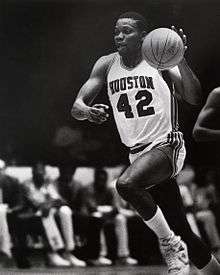Houston Cougars men's basketball
| Houston Cougars | |||
|---|---|---|---|
| |||
 | |||
| University | University of Houston | ||
| First season | 1946 | ||
| Conference | American Athletic Conference | ||
| Location | Houston, TX | ||
| Head coach | Kelvin Sampson (3rd year) | ||
| Arena |
Fertitta Center (Capacity: 8,500) | ||
| Nickname | Cougars | ||
| Colors |
Scarlet and Albino[1] | ||
| Uniforms | |||
| |||
| NCAA Tournament runner-up | |||
| 1983, 1984 | |||
| NCAA Tournament Final Four | |||
| 1967, 1968, 1982, 1983, 1984 | |||
| NCAA Tournament Elite Eight | |||
| 1967, 1968, 1982, 1983, 1984 | |||
| NCAA Tournament Sweet Sixteen | |||
| 1956, 1961, 1965, 1967, 1968, 1970, 1971, 1982, 1983, 1984 | |||
| NCAA Tournament appearances | |||
| 1956, 1961, 1965, 1966, 1967, 1968, 1970, 1971, 1972, 1973, 1978, 1981, 1982, 1983, 1984, 1987, 1990, 1992, 2010 | |||
| Conference tournament champions | |||
| 1978, 1981, 1983, 1984, 1992, 2010 | |||
| Conference regular season champions | |||
| 1946, 1947, 1950, 1956, 1983, 1984, 1992 | |||
The Houston Cougars men's basketball team represents the University of Houston in Houston, Texas, in the NCAA Division I men's basketball competition. The university is a member of the American Athletic Conference. The team last played in the NCAA Men's Division I Basketball Tournament in 2010 and is tied for eighth in number of Final Four appearances.
History
Early history (1946–56)
Although the University of Houston already had a women's basketball program, the Houston Cougars men's basketball program didn't begin until the 1945–46 season. During their first two seasons, the team won the Lone Star Conference regular season title, and made it to post season play in the NAIA Men's Basketball tournament. The team also appeared in back to back years of 1946, 1947. The Cougars had an all time NAIA tournament record of 2–2 in 2 years.
During Pasche's tenure, he posted a 135–116 record.[2] Under his leadership in 1949, the Cougars won the Gulf Coast Conference championship. College Basketball Hall of famer coach Guy V. Lewis played for Pasche, and eventually became an assistant coach before being handed the job upon Alden Pasche's retirement.
Guy Lewis era (1956–86)
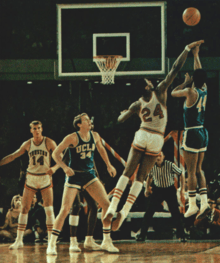

Pasche retired after the 1955–56 season, and Houston assistant Guy Lewis was promoted to the head coaching position. Lewis, a former Cougar player, led Houston to 27 straight winning seasons and 14 seasons with 20 or more wins, including 14 trips to the NCAA Tournament. His Houston teams made the Final Four on five occasions (1967, 1968, 1982–84) and twice advanced to the NCAA Championship Game (1983, 1984). Among the outstanding players who Lewis coached are Elvin Hayes, Hakeem Olajuwon, Clyde Drexler, Otis Birdsong, Dwight Jones, Don Chaney and "Sweet" Lou Dunbar.
Lewis's UH teams twice played key roles in high-profile events that helped to popularize college basketball as a spectator sport. In 1968, his underdog, Elvin Hayes-led Cougars upset the undefeated and top-ranked UCLA Bruins in front of more than 50,000 fans at Houston’s Astrodome. The game became known as the “Game of the Century” and marked a watershed in the popularity of college basketball. In the early 1980s, Lewis's Phi Slama Jama teams at UH gained notoriety for their fast-breaking, "above the rim" style of play as well as their overall success. These teams attracted great public interest with their entertaining style of play. At the height of Phi Slama Jama's notoriety, they suffered a dramatic, last-second loss in the 1983 NCAA Final that set a then-ratings record for college basketball broadcasts and became an iconic moment in the history of the sport. Lewis's insistence that these highly successful teams play an acrobatic, up-tempo brand of basketball that emphasized dunking brought this style of play to the fore and helped popularize it amongst younger players.
Houston lost in both NCAA Final games in which Lewis coached, despite his "Phi Slama Jama" teams featuring superstars Clyde Drexler and Hakeem Olajuwon. In 1983, Houston lost in a dramatic title game to the North Carolina State Wolfpack on a last-second dunk by Lorenzo Charles. The Cougars lost in the 1984 NCAA Final to the Georgetown Hoyas, led by Patrick Ewing. Lewis retired from coaching in 1986 at number 20 in all-time NCAA Division I victories, his 592–279 record giving him a .680 career winning percentage.
As a coach, Lewis was known for championing the once-outlawed dunk, which he characterized as a "high percentage shot", and for clutching a brightly colored red-and-white polka dot towel on the bench during games. Lewis was a major force in the racial integration of college athletics in the South during the 1960s, being one of the first major college coaches in the region to actively recruit African-American athletes. His recruitment of Elvin Hayes and Don Chaney in 1964 ushered in an era of tremendous success in Cougar basketball. The dominant play of Hayes led the Cougars to two Final Fours and sent shock waves through Southern colleges that realized that they would have to begin recruiting black players if they wanted to compete with integrated teams.
Welcome to Conference USA (1996–98)
After 21 years in the Southwest Conference, the Cougars joined Conference USA in 1996. Under head coach Alvin Brooks, the basketball program had a disappointing initial season in C-USA. The team went 3–11 against C-USA teams in 1996–97. The next season was even more futile. Brooks, who had led the Cougars since 1993, coached the Cougars to a rock bottom conference record of 2–14 in 1997–98. The last, and only other, time the Cougars recorded only two conference victories in a season was in 1950–51; their first season in the Missouri Valley Conference.
Return to glory (1998–2000)
One of Houston's biggest sports icons and one of the Cougars best basketball players ever, Clyde Drexler was hired to coach the program that he led as a player to the 1983 NCAA Final as part of Phi Slama Jama. Basketball excitement was back on campus, and fans looked forward to the promising years to come. After just two seasons however, Drexler resigned as head coach to spend more time with his family.
Striving for success (2000–04)
Ray McCallum was hired to do what Clyde Drexler could not—lead the Cougars to a winning season and earn a spot in the NCAA Tournament. After losing seasons in each of his first two years, McCallum guided the Cougars to an 18–15 record in 2001–02. That season, the team won two conference tournament games and qualified for the National Invitation Tournament. However, the team regressed in the following season and failed to qualify for their own C-USA tournament.
Two steps forward, one step back (2004–07)
2004–05
Tom Penders was named as the head coach of Cougars basketball in 2004. Known as "Turnaround Tom" for his reputation of inheriting sub-par basketball programs and making them better, Penders was hired to rebuild a program that recorded only one winning season in its last eight years. After a surprising debut season in 2004–05 that led to an NIT appearance, the team had high hopes to build on their relative success and make the NCAA Tournament in 2006.
2005–06
The 2005–06 season looked promising at the outset. The Cougars started their first game on a 30–0 scoring run against the Florida Tech Panthers. Less than two weeks later, the Cougars beat the nationally ranked LSU Tigers on the road and the Arizona Wildcats at home. The surprising wins earned the Cougars their first national ranking in several years. The team that seemed destined for an NCAA Tournament berth failed to capitalize on their success and national recognition and began to stumble after a loss to South Alabama Jaguars in December. The Cougars won only one conference tournament game and had to settle again for another NIT bid.
2006–07
Dubbed as "The Show," the 2006–07 Cougars entered the season with cockiness and strong expectations to finally make it into the NCAA Tournament. A difficult schedule matched the Cougars with seven different teams that would end up qualifying for either the 2007 NCAA Tournament or NIT. Houston lost three times to the Memphis Tigers and once each to Arizona, the Creighton Bluejays, the Kentucky Wildcats, South Alabama, the UNLV Runnin' Rebels, and the VCU Rams. By going 0–9 against these quality teams, the Cougars proved they were not worthy of an at-large bid to the NCAA Tournament. Not surprisingly, two conference tournament wins against lower seeds and an unimpressive 18–15 overall record were not even enough to earn the team an invitation to the NIT.
Team goal: NCAA Tournament (2007–present)
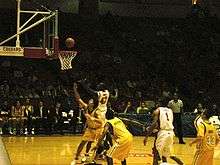
In 2007–08 the team introduced a new nickname ("The Show—In 3D") and a slightly new uniform (a changed trim design). The team hoped to reach the NCAA Tournament for the first time since 1992. Eight straight home games from November 21 to December 29 helped the Cougars get off to an 11–1 start. However, the team lost most of its critical games at the end of the season, including their last two games (both against the UTEP Miners). Houston received an invitation to the inaugural College Basketball Invitational tournament and defeated the Nevada Wolf Pack and the Valparaiso Crusaders but lost to their conference rival, the Tulsa Golden Hurricane, in the semifinal round.
The 2008–09 season began on November 11 with a two-point loss to the Georgia Southern Eagles; this was the first game of the Division I college basketball season and the opening game of the 2K Sports Classic tournament in Durham, North Carolina. A Cougars win would have meant a second round matchup with the Duke Blue Devils. Overall, the Cougars played a balanced home and away regular season schedule. Fifteen games (three in November, three in December, four in January, three in February, and two in March) were played at Hofheinz Pavilion. There were fourteen away games (two in November, two in December, five in January, and five in February).
The 2009–10 team finished the regular season 15–15 and 7–9 in C-USA, finishing seventh place in the conference. Following a 93–80 win over East Carolina in the first round of the C–USA Tournament, the Cougars beat Memphis 66–65, ending a string of four tournament titles for the Tigers. In the next game, they defeated Southern Miss 74–66 to advance to the championship game. Finally, the Cougars beat #25 ranked UTEP 81–73 to earn the conference's bid to the NCAA Tournament, their first since 1992. In the First Round of the NCAA Tournament, Houston, seeded 13th, was defeated 89–77 by 4th-seeded Maryland.
Penders announced his resignation as Houston head coach on March 22, 2010.[3]
The school hired James Dickey on March 21, 2010.[4] In four season with Houston, Dickey amassed a 64–62 record with no NCAA Tournament appearances.
Beginning with the 2013–14 season, Houston joined the newly created American Athletic Conference following the Big East realignment.
On March 2014, Dickey stepped down as head coach because of "private family matters".[5]
On April 3, 2014, Houston hired Kelvin Sampson as the new Cougars head coach.[6] Sampson had just become eligible to be a college coach again after receiving a five-year show cause penalty in 2008 for sanctions against him during his time as Indiana head coach.[6] In 2014–15, Houston struggled again, finishing with a 13–19 record and 4–14 in the AAC. The 2015–16 team led a resurgence, finishing 22–10, 12–6, but lost in the AAC Tournament and in the first round of the NIT.
Recent records
| As Conference USA member | ||||
|---|---|---|---|---|
| Season | Overall record* | C-USA tournament record | Postseason record | Head coach |
| 1996–97 | 11–16 (3–11) | 0–1; Lost in first round | Alvin Brooks | |
| 1997–98 | 9–20 (2–14) | 0–1; Lost in first round | Alvin Brooks | |
| 1998–99 | 10–17 (5–11) | 0–1; Lost in first round | Clyde Drexler | |
| 1999-00 | 9–22 (2–14) | 1–1; Lost in quarterfinal | Clyde Drexler | |
| 2000–01 | 9–20 (6–10) | 0–1; Lost in first round | Ray McCallum | |
| 2001–02 | 18–15 (9–7) | 2–1; Lost in semifinal | 0–1 in NIT | Ray McCallum |
| 2002–03 | 8–20 (6–10) | 0–1; Lost in first round | Ray McCallum | |
| 2003–04 | 9–18 (3–13) | Ray McCallum | ||
| 2004–05 | 18–14 (9–7) | 0–1; Lost in first round | 0–1 in NIT | Tom Penders |
| 2005–06 | 21–10 (9–5) | 1–1; Lost in semifinal | 1–1 in NIT | Tom Penders |
| 2006–07 | 18–15 (10–6) | 2–1; Lost in final | Tom Penders | |
| 2007–08 | 24–10 (11–5) | 0–1; Lost in quarterfinal | 2–1 in CBI | Tom Penders |
| 2008–09 | 21–12 (10–6) | 2–1; Lost in semifinal | 0–1 in CBI | Tom Penders |
| 2009–10 | 19–16 (7–9) | 4–0; Won championship | 0–1 in NCAA | Tom Penders |
| 2010–11 | 12–18 (4–12) | 0–1; Lost in first round | James Dickey | |
| 2011–12 | 15–15 (7–9) | 0–1; Lost in first round | James Dickey | |
| 2012–13 | 20–13 (7–9) | 1–1; Lost in quarterfinal | 1–1 in CBI | James Dickey |
| As American Athletic Conference member | ||||
|---|---|---|---|---|
| Season | Overall record* | The American tournament record | Postseason record | Head coach |
| 2013–14 | 17–16 (8–10) | 1–1; Lost in quarterfinal | James Dickey | |
| 2014–15 | 13–19 (4–14) | 1–1; Lost in quarterfinal | Kelvin Sampson | |
| 2015–16 | 22–10 (12–6) | 0–1; Lost in first round | 0–1 in NIT | Kelvin Sampson |
* Overall record includes regular season and tournament/postseason results; Regular season conference record contained in parentheses
Postseason play
NCAA Men's Division I Tournament results
The Cougars have appeared in 19 NCAA Tournaments. Their overall record is 26–24.
| Year | Round | Opponent | Result |
|---|---|---|---|
| 1956 | Regional Semifinals Regional 3rd Place Game | SMU Kansas State | L 74–89 L 70–89 |
| 1961 | Regional Quarterfinals Regional Semifinals Regional 3rd Place Game | Marquette Kansas State Texas Tech | W 77–61 L 64–76 L 67–69 |
| 1965 | Regional Quarterfinals Regional Semifinals Regional 3rd Place Game | Notre Dame Oklahoma State SMU | W 99–98 L 60–75 L 87–89 |
| 1966 | Regional Quarterfinals Regional Semifinals Regional 3rd Place | Colorado State Oregon State Pacific | W 82–76 L 60–63 W 102–91 |
| 1967 | Regional Quarterfinals Regional Semifinals Regional Finals Final Four National 3rd Place Game | New Mexico State Kansas SMU UCLA North Carolina | W 59–58 W 66–53 W 83–75 L 58–73 W 84–62 |
| 1968 | Regional Quarterfinals Regional Semifinals Final Four National 3rd Place Game | Loyola–Chicago Louisville TCU UCLA Ohio State | W 94–76 W 91–75 W 103–68 L 69–101 L 85–89 |
| 1970 | Regional Quarterfinals Regional Semifinals Regional 3rd Place | Dayton Drake Kansas State | W 71–64 L 87–92 L 98–107 |
| 1971 | Regional Quarterfinals Regional Semifinals Regional 3rd Place | New Mexico State Kansas Notre Dame | W 72–69 L 77–78 W 119–106 |
| 1972 | Regional Quarterfinals | Texas | L 74–85 |
| 1973 | Regional Quarterfinals | Southwest Louisiana | L 89–102 |
| 1978 | Regional Quarterfinals | Notre Dame | L 77–100 |
| 1981 | First Round | Villanova | L 72–90 |
| 1982 | First Round Second Round Sweet Sixteen Elite Eight Final Four | Alcorn State Tulsa Missouri Boston College North Carolina | W 94–84 W 78–74 W 79–78 W 99–92 L 63–68 |
| 1983 | Second Round Sweet Sixteen Elite Eight Final Four National Championship Game | Maryland Memphis State Villanova Louisville NC State | W 60–50 W 70–63 W 89–71 W 94–81 L 52–54 |
| 1984 | Second Round Sweet Sixteen Elite Eight Final Four National Championship Game | Louisiana Tech Memphis State Wake Forest Virginia Georgetown | W 77–70 W 78–71 W 68–63 W 49–47 OT L 75–84 |
| 1987 | First Round | Kansas | L 55–66 |
| 1990 | First Round | UC Santa Barbara | L 66–70 |
| 1992 | First Round | Georgia Tech | L 60–65 |
| 2010 | First Round | Maryland | L 77–89 |
NIT results
The Cougars have appeared in ten National Invitation Tournaments (NIT). Their combined record is 5–10.
| Year | Round | Opponent | Result/Score |
|---|---|---|---|
| 1962 | Quarterfinals | Dayton | L 77–94 |
| 1977 | First Round Quarterfinals Semifinals Finals | Indiana State Illinois State Alabama St. Bonaventure | W 83–82 W 91–90 W 82–76 L 91–94 |
| 1985 | First Round | Lamar | L 71–78 |
| 1988 | First Round Second Round | Fordham Colorado State | W 69–61 L 61–71 |
| 1991 | First Round | Stanford | L 86–93 |
| 1993 | First Round | UTEP | L 61–67 |
| 2002 | Opening Round | Vanderbilt | L 50–59 |
| 2005 | Opening Round | Wichita State | L 69–85 |
| 2006 | First Round Second Round | BYU Missouri State | W 77–67 L 59–60 |
| 2016 | First Round | Georgia Tech | L 62–81 |
CBI
The Cougars have appeared in the College Basketball Invitational (CBI) three times. Their combined record is 3–3.
| Year | Round | Opponent | Result/Score |
|---|---|---|---|
| 2008 | First Round Quarterfinals Semifinals | Nevada Valparaiso Tulsa | W 80–79 W 91–67 L 69–73 |
| 2009 | First Round | Oregon State | L 45–49 |
| 2013 | First Round Quarterfinals | Texas George Mason | W 73–72 L 84–88 OT |
NAIA tournament results
The Cougars have appeared in the NAIA Tournament two times. Their combined record is 2–2.
| Year | Round | Opponent | Result |
|---|---|---|---|
| 1946 | First Round Second Round | High Point Indiana State | W 63–34 L 43–62 |
| 1947 | First Round Second Round | Montana State Northern Arizona | W 60–58 L 42–44 |
Notable players
- Cadillac Anderson†
- Otis Birdsong†
- Don Chaney†‡
- Dwight Davis†
- Dion Dowell†
- Clyde Drexler†
- Rolando Ferreira†
- Alton Ford†
- Anthony Goldwire†
- Joe Hamood‡
- Elvin Hayes†
- Carl Herrera†
- Damon Jones†
- Dwight Jones†
- Leary Lentz‡
- Ted Luckenbill†
- Sam Mack†
- Larry Micheaux†
- Hakeem Olajuwon†
- Bo Outlaw†
- Andre Owens†
- Gary Phillips†
- George Reynolds†
- Jonathon Simmons†
- Ken Spain‡
- Ollie Taylor‡
- Rob Williams†
- Rickie Winslow†
- Michael Young†
† Played in the National Basketball Association (current players in bold)
‡ Played in the American Basketball Association
Retired numbers
The Cougars have retired the numbers of five men's basketball players: Otis Birdsong, Clyde Drexler, Elvin Hayes, Hakeem Olajuwon, and Michael Young.
Birdsong
1973–77
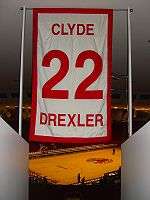
Drexler
1980–83
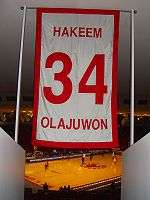
Olajuwon
1981–84

Young
1980–84
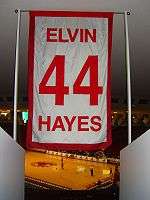
Hayes
1964–68
See also
References
- ↑ 1 second ago. "University of Houston Athletics :: UH Cougars :: Official Athletic Site". UH Cougars. Retrieved 2016-03-24.
- ↑ "First UH basketball Coach Pasche dead". Houston Chronicle. 1985-05-10. Retrieved 2008-07-16.
- ↑ http://abcnews.go.com/Sports/wireStory?id=10170600
- ↑ "Ex-Tech coach James Dickey wins race for UH job". Houston Chronicle. Retrieved 2016-04-07.
- ↑ "Cougars' Dickey resigns; Sampson in line?". ESPN.com. Retrieved 2016-04-07.
- 1 2 "UH reaches five-year deal with Kelvin Sampson". Houston Chronicle. Retrieved 2016-04-07.
External links
| Wikimedia Commons has media related to Houston Cougars men's basketball. |
